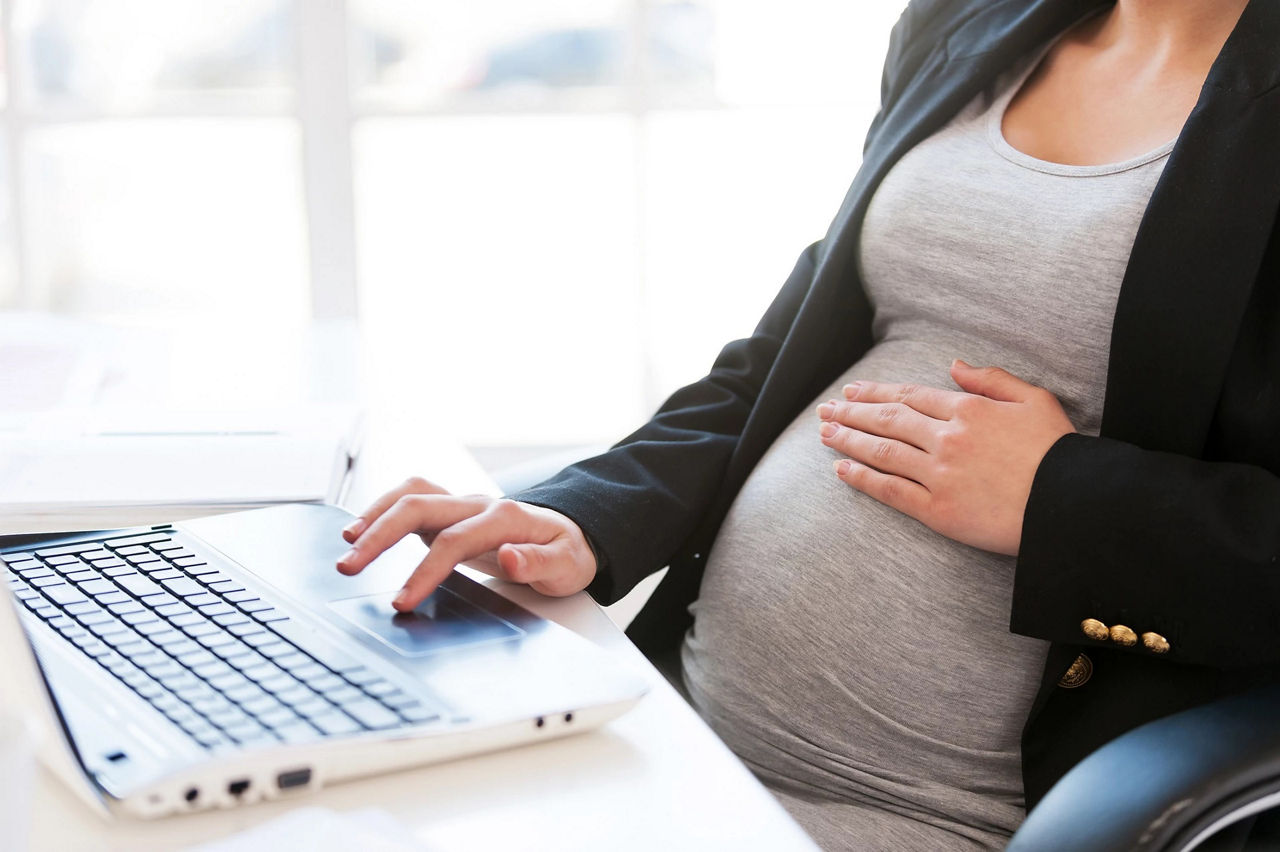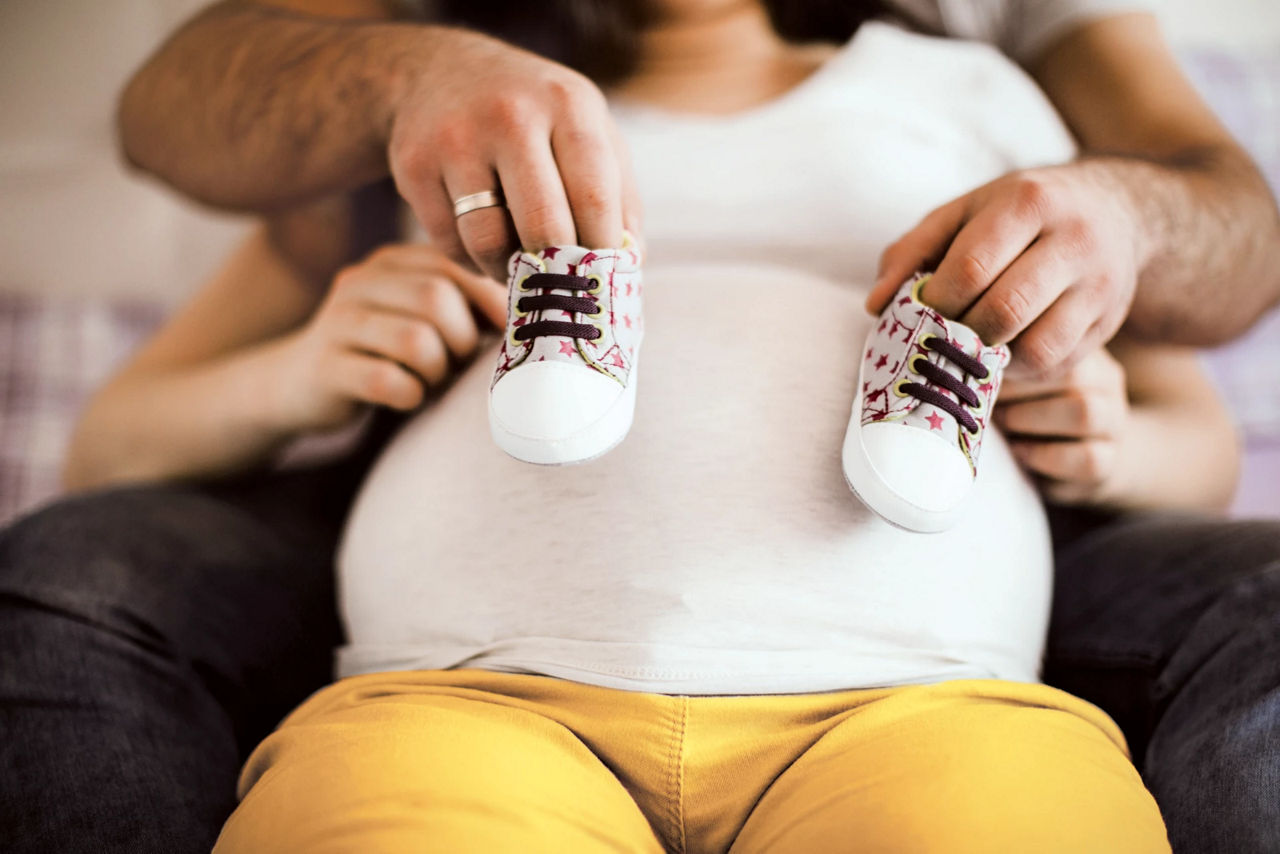Free weaning plan - Register here
Discovering you’re pregnant is a very exciting time. You’re looking forward to meeting your new baby, and planning for the changes that becoming a parent brings. You might be starting to think about the practicalities, too, such as when to tell work you’re pregnant.
Maternity leave, paternity leave and what your rights are - these are all big considerations as you begin your parenting journey.
At C&G Baby Club, we believe that all parents need less judgment during their parenting journey, pregnancy included. We’re exploring important issues such as pregnancy discrimination, being made redundant on maternity leave, and what to do if you’re missing work due to pregnancy sickness. We’ll also take a look at self-employed maternity leave and what happens if you’re adopting.
Here’s what you need to know about your pregnancy rights at work.
When do I tell my boss I'm pregnant?
You might want to share your pregnancy news straight away, or you might feel more comfortable waiting until a little later. Whatever you decide, do what’s right for you. But when do you tell work you’re pregnant?
Legally, you’ll need to tell your employer that you’re pregnant, inform them of your due date and when you expect to start your maternity leave, no later than 15 weeks before your due date1.
It’s only natural that you might feel a little nervous. You might be worried about how your boss will react, as well as the impact it might have on your career. Try to relax. It’s highly likely that your employer will be supportive and happy for you.
However, if you feel you’re being unfairly treated at any point, contact your local Citizen's Advice Bureau who’ll be able to advise you about the maternity rights in place to protect you.

Pregnancy rights at work
As a pregnant employee, you have a number of rights. The main ones include1:
- Maternity leave
- Paid time off for any antenatal care before your baby arrives (your partner is entitled to paid time off for 2 antenatal appointments)
- Maternity pay or maternity allowance
- The right to be protected against dismissal, unfair treatment or discrimination
Your employer isn’t allowed to change the terms of your employment contract without your agreement. They’ll also need to carry out a health and safety risk assessment to ensure that your place of work is comfortable and safe during your pregnancy2.
Pregnancy discrimination
Pregnancy discrimination happens when you’ve been treated unfavourably because you’re pregnant. It doesn’t have to be the only reason for the unfair treatment, it just has to be one of them3. It’s also irrelevant if the person or people discriminating against you had no intention to do so, it’s still illegal.
Types of pregnancy discrimination include being dismissed from your place of work and being required to work during your maternity leave. It also includes being prevented from returning to work because you’re breastfeeding4.
Some pregnancy discrimination at work examples
Pregnancy hiring discrimination
If you’re changing roles or ready for a new position, pregnancy shouldn’t stop you. If a potential employer doesn’t offer you a job, and the reason (or one of the reasons) is that you’re pregnant, that’s pregnancy discrimination and it isn’t OK.
Pregnancy promotion discrimination
As with pregnancy hiring discrimination, not being given a promotion because you’re expecting a baby counts as unfavourable treatment and is unlawful.
Make no mistake, pregnancy discrimination is unacceptable and unlawful. If you’re worried it might be happening to you, there are things you can do. You may even wish to seek legal advice to explore your options.
Missing work due to pregnancy-related sickness
If you feel unwell due to pregnancy symptoms, you may need some time off work to rest and recover, and that’s OK. It’s important to look after yourself, without worrying about what the implications will be for your job.
It’s good for you to know that your employer isn’t allowed to discriminate against you if you’re sick during your pregnancy, and you can’t be dismissed because of it. You’ll be entitled to statutory sick pay or any other sick pay that’s offered by your employer up until 4 weeks before your due date5.
If you’re unwell and off work during the 4 weeks before your due date, maternity leave or statutory maternity allowance will start automatically1.
Stress leave from work while pregnant
Having a baby is amazing, but it can take a lot out of you physically and emotionally. Add the mental strain of worrying about how work may affect your pregnancy, and it’s easy to see why you might need to take some time out.
If you’re struggling to work whilst pregnant, you won’t find any judgment here. We’re just going to say it - working while pregnant is hard. Try not to compare yourself to others and be sure to put yourself first. Talk to your employer about any changes you might be able to put in place to make things a little easier. For example, the possibility of more flexible working patterns or reducing your hours6.
Remember that you’re not alone. If you start to feel worried or overwhelmed by how you’re feeling during your pregnancy, speak to your midwife or GP for support.
Maternity leave
Maternity leave is the time off that you take when pregnant and once you’ve had your baby. This gives you the chance to spend some time with your new baby and gives your body time to recover after giving birth.
It doesn’t matter how long you’ve worked for your employer, you’re entitled to 52 weeks of maternity leave7. You’ll have to take at least two weeks off work after giving birth, but the rest is up to you. Some women will use all of their maternity leave, whilst others are ready to go back to work much sooner.
There’s no right or wrong here. There’s only what’s right for you.
Can you be made redundant on maternity leave?
Yes. However, you can’t be made redundant because you’re pregnant or on maternity leave8.
Your rights don’t end there. If you’re facing redundancy whilst on maternity leave, your employer must offer you a suitable alternative if there’s one available in your workplace9.
Do you get maternity leave if you adopt?
If you’re embarking on your adoption journey, you might be eligible for statutory adoption leave which, just like maternity leave, lasts for 52 weeks. To be eligible, you must10:
- Be classed as an employee
- Inform your employer
- Provide proof of the adoption, and be adopting your child through an adoption agency (this means that if you’re adopting privately, you won’t be entitled to adoption leave)
Self-employed maternity leave
If you’re self-employed you’re not entitled to take maternity leave, but you may be entitled to maternity allowance, a benefit that enables you to take time off when you have your baby.
Maternity allowance lasts for up to 39 weeks and you can find out more information about how it works from your local Citizens Advice Bureau and here at the gov.uk website.
Shared parental leave
Shared Parental Leave allows you and your spouse or partner, to share the experience of raising your baby during their first year of life.
To be eligible, you must11:
- Be having a baby or using a surrogate have a baby.
- Be adopting a child.
- Be fostering a child you’re planning to adopt.
If this is something you choose to do, and you’re eligible, you can share up to 50 weeks of leave from your place of work and up to 37 weeks of pay11.
- https://www.gov.uk/working-when-pregnant-your-rights
- https://www.hse.gov.uk/mothers/employer/risk-assessment.htm
- https://www.citizensadvice.org.uk/law-and-courts/discrimination/what-are-the-different-types-of-discrimination/pregnancy-and-maternity-discrimination/
- https://www.acas.org.uk/managing-your-employees-maternity-leave-and-pay/discrimination-because-of-pregnancy-and-maternity
- https://www.acas.org.uk/managing-your-employees-maternity-leave-and-pay/if-theyre-ill-or-having-a-difficult-pregnancy
- https://www.nhs.uk/pregnancy/keeping-well/your-health-at-work/
- https://www.gov.uk/maternity-pay-leave/leave
- https://www.citizensadvice.org.uk/about-us/about-us1/media/press-releases/citizens-advice-faqs-can-you-be-made-redundant-while-pregnant-or-on-furlough/#:~:text=You%20can't%20be%20made,automatic%20unfair%20dismissal%E2%80%9D%20and%20discrimination
- https://www.acas.org.uk/sites/default/files/2021-03/managing-redundancy-for-pregnant-employees-or-those-on-maternity-leave.pdf
- https://www.acas.org.uk/your-adoption-leave-pay-and-other-rights
- https://www.gov.uk/shared-parental-leave-and-pay
Last reviewed 13.04.2022
Reviewed by Nutricia’s Medical and Scientific Affairs Team
More from pregnancy
#LoveDontJudge. A community calling time on parental judgement
The C&G baby club community are embracing everything love and calling time on all forms of judgement.
Discover how other families and the media are supporting our #LoveDontJudge campaign.

Join our baby club
Ready to stop worrying about what other people think and do what feels right to you? We’ll give you the support you need to follow your instincts and enjoy parenthood to the max:
Helpful emails
Non-judgemental support
Free weaning plan
Tips from real parents
Pregnancy topics
Need free advice with a smile? Get in touch with our dedicated Care team.
Ask us a question (8am - 8pm Monday to Friday, 10am - 4pm Weekends)
Messenger
Contact us on Facebook (10am - 10pm, 7 days a week)
Call us
Call us on 0800 977 8880 (8am - 8pm Monday to Friday)
FAQs
Get answers to your most frequently asked questions







